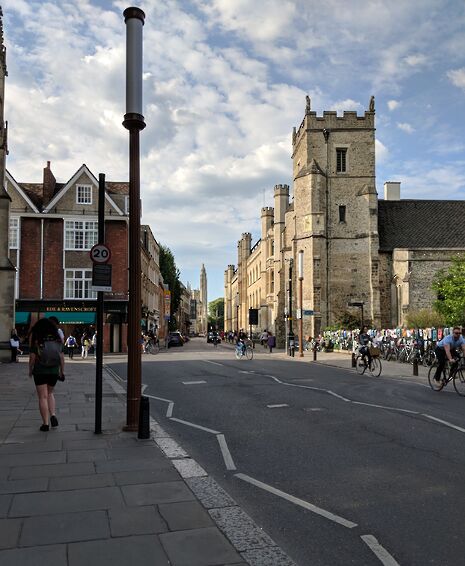“I don’t have a clue what I’m going to do next” – the continued struggle of a finalist
Continuing her musings on third year life, Holly Platt-Higgins turns to Cambridge’s corporate career pressure

University is, to some extent, just a giant play-pen; a place to waste three years in both safety and comfort as you begin to cross the treacherous border into adulthood. But, there is the general assumption that alongside your disgusting mountain of debt, catalogue of bad decisions and selection of happy memories, you will also leave university with a sense of direction; a newfound assertion of who you are and what you want to do with your life. Unfortunately, this has not quite happened for me.
Now, as I head into my final year at Cambridge, the million-dollar-question on grandparents' and supervisors' lips alike has migrated to a rather serious topic; ‘So Holly, what are you going to do when you finish?’ And, although it is incredibly awkward when my Grandpa tries to talk to me about boyfriends or colonialism, nothing really compares to the underwhelming, the horribly flat atmosphere left hanging in a room when you do not have an answer for this question.
Obviously, the words, ‘I don’t know’, cannot be uttered in response. So, you try and fudge your way around an answer, ‘Well, I’d like to do some travelling and writing…maybe an internship… yeah, something creative, I’m not really interested in the whole corporate… I think I’m just figuring out my options at the moment.’
And most people, because they’re nice and kind, will let you get away with this. The stock-phrases, ‘well, you don’t have to know right now’ and ‘I think it is just ridiculous the way you kids are expected to have it all planned out’, are frequently dusted off and lovingly presented to you.

Most people tend to decode your bric-a-brac answer as, ‘I don’t actually have a clue what I’m going to do’ and then, empathetically, offer up tales of various people’s journeys from unsteady starts to current successes. The story about Craig’s development from a low 2.2 at a polytechnic, to the position of well-respected QC, is offered, partly as a comfort blanket for you but, more importantly, as a cover up for the mess your uncertain trajectory has left lingering in the room.
Currently, the majority of people I’ve shared my university experience with are frantically producing cover letters and filling in applications to become some swanky banker-ceo-consultant-city-type. And while I haven’t chosen a path for myself just yet, I know whatever it is, it isn’t one which includes 5.30am starts, pant-suits and people saying things like ‘blue-sky thinking’ or ‘thanks for putting that on my radar.’
Cambridge often seems to only really offer three options for students once they’ve finished their undergraduate degrees: you can either carry on, stay and do a masters and a PhD and then eventually become an academic yourself; or leave to become a consultant; or leave to become a banker.
Cambridge often seems to only offer three options for graduates: go into academia, be a consultant or become a banker
Once you make it to third year, the careers service email you on a weekly basis; notifying you with upcoming events that you might be interested in. And, while there was one token, ‘but I don’t want to work in the city’ talk this term, the updates usually sent out just include events with titles that sound like an introduction to selling your soul for six-figures and sadness: ‘capital partners’, ‘strategy consultants’, ‘personal branding’, they don’t exactly entice the creative arts degree types.
And although my plans for next year are something I feel increasingly pressured to worry about, the thing is, realistically, unless I accidentally become addicted to crystal meth or online gambling or somehow become one of those hoarders you see on TLC, whose lives have been put on hold because of their clutter collection, I will probably just get a job and pay the bills like every other functioning adult in society, because, despite what your parents or your partner might tell you, you’re actually not that special.
Fine, I currently do not know what that job will be, but how much does that really matter? We don’t know what’s going to make us happy and therefore the idea that we would rigidly implement expectation for ourselves and our life picture seems ridiculous. You might think you want a bunch of kids, a house in the country, a black Labrador named Lola and a Range Rover but, it could turn out that you’re fulfilled by moving to Slovenia, living in a cabin and indulging in your newfound passion for water-sports.

So, what I’ve come to realise this last week, as people console me for not wanting to be a consultant, is that I’m not actually scared about moving into ‘the real world’ or even what I’ll end up doing in; I think I’m probably just terrified of everyone watching as I try and take my place in it, ‘the real world.’
We are a generation who have grown-up with and relentlessly fed from accessibility. Every question, curiosity and momentary desire we have can be instantly gratified because, everything is in pocket. This level of accessibility breeds a relentless increase in the availability of comparison. Even if we don’t intend to, we can keep tabs on everyone via social media, and, as a generation, we absentmindedly consume and judge every heart-break, housewarming and holiday that our peers go on to experience.
If you know you want to be an academic, consultant or banker, the whole post-uni thing is actually pretty easy, because you’re still moving as part of a relatively large pack. But, if you haven’t quite found your direction and you’re going out on a limb, moving off the communal path and starting to go your uncertain own way, the burden of accountability falls solely, for the first time, on your head.
But we shouldn’t be afraid to break away from the Cambridge ideals of success. As Arianna Huffington said, ‘Don’t buy society’s definition of success. Because it’s not working for anyone. It’s not working for women, it’s not working for men, it’s not working for polar bears. It’s only truly working for those who make pharmaceuticals for stress, diabetes, heart disease, sleeplessness, and high blood pressure.’ So maybe even though you’re not looking to be the typical Cambridge idea of successful, it might be the safest direction to be moving as you leave university.
 News / Caius mourns its tree-mendous loss23 December 2025
News / Caius mourns its tree-mendous loss23 December 2025 Comment / Yes, I’m brown – but I have more important things to say22 December 2025
Comment / Yes, I’m brown – but I have more important things to say22 December 2025 News / Cambridge welcomes UK rejoining the Erasmus scheme20 December 2025
News / Cambridge welcomes UK rejoining the Erasmus scheme20 December 2025 News / CUP announces funding scheme for under-represented academics19 December 2025
News / CUP announces funding scheme for under-represented academics19 December 2025 Interviews / Politics, your own way: Tilly Middlehurst on speaking out21 December 2025
Interviews / Politics, your own way: Tilly Middlehurst on speaking out21 December 2025










